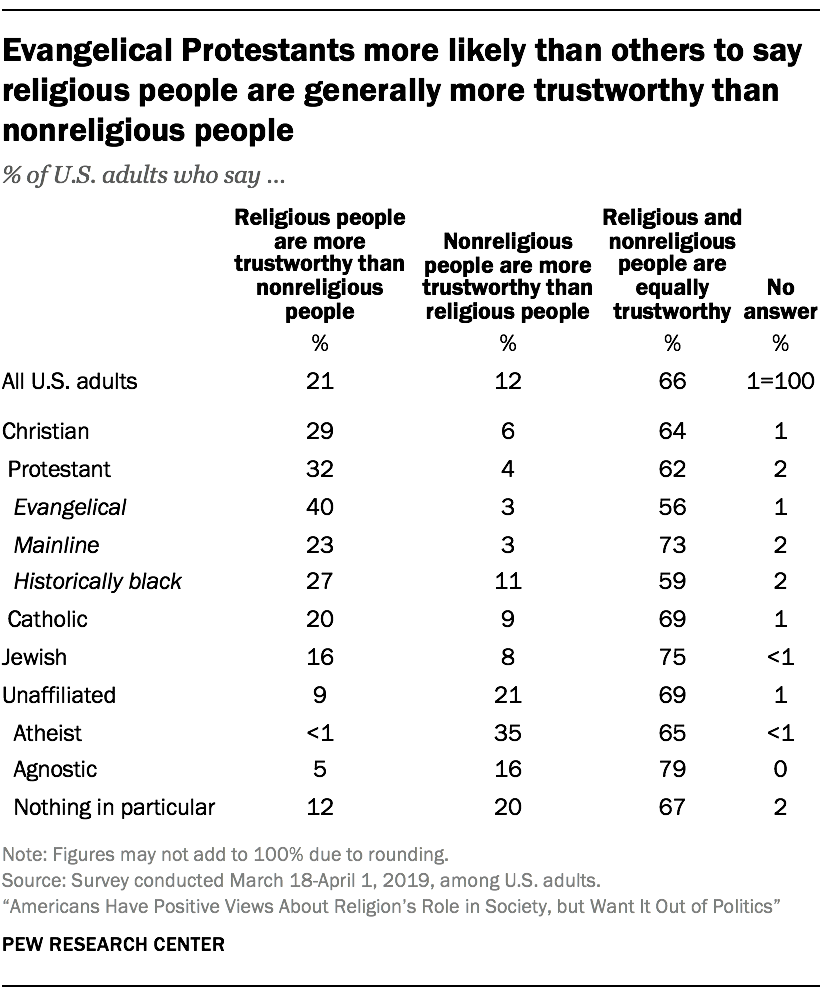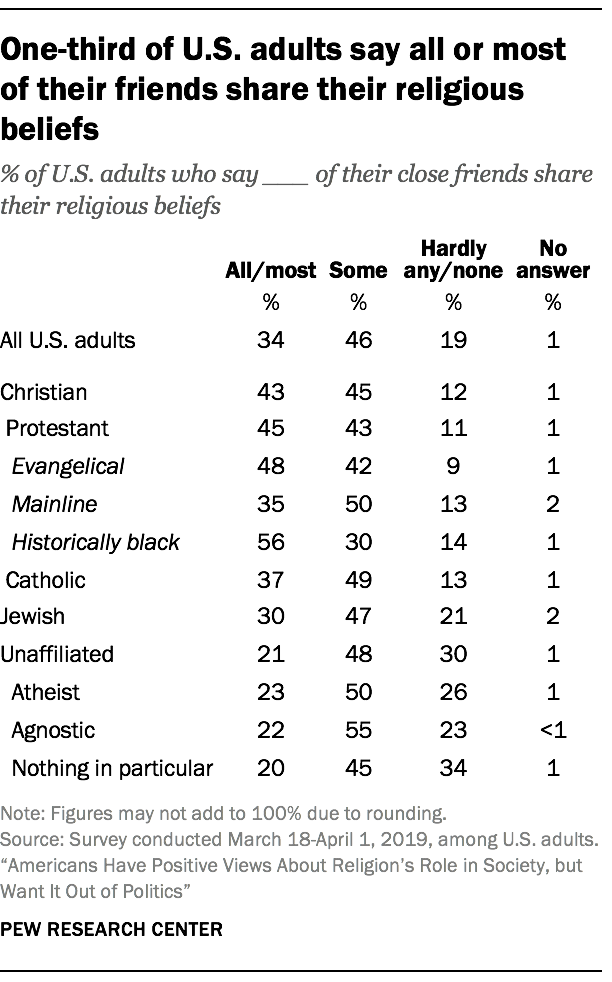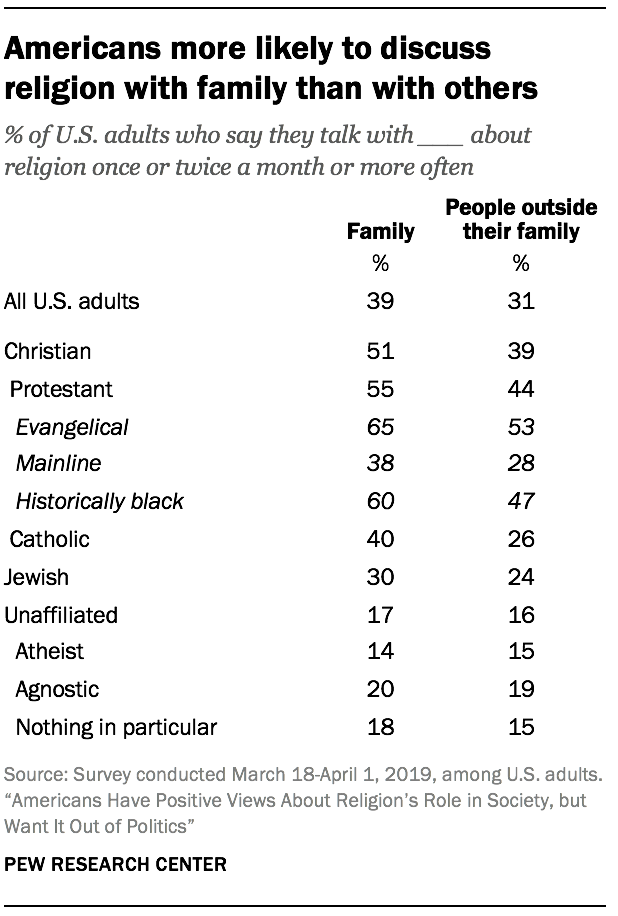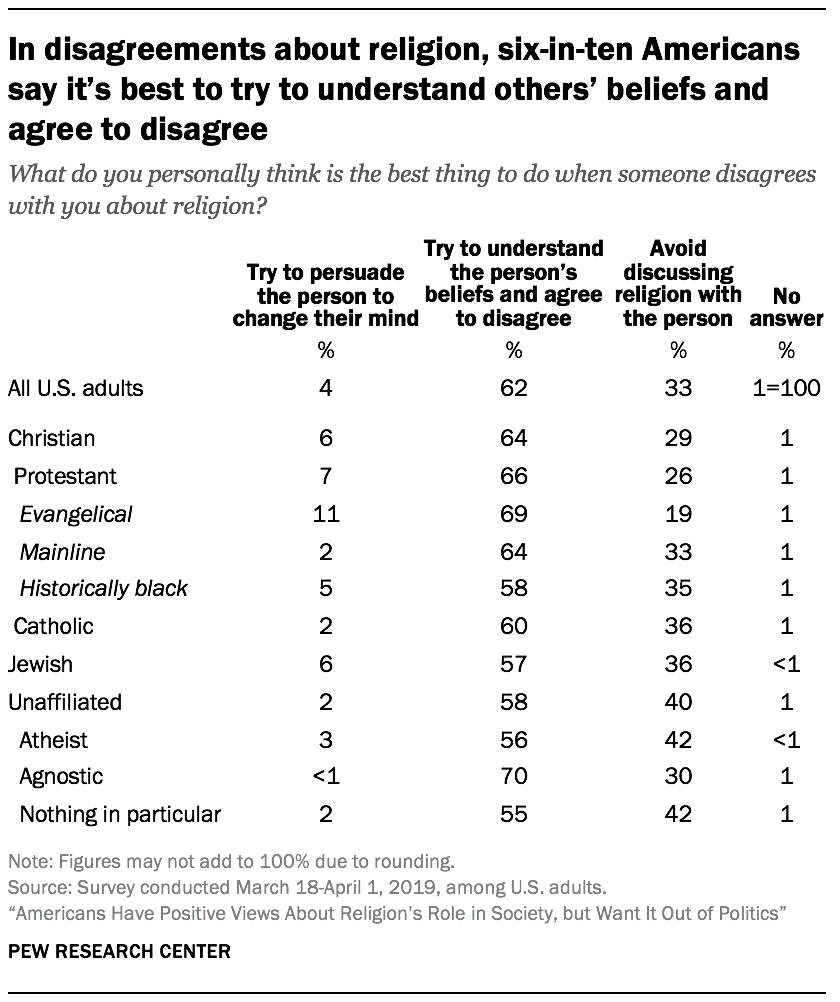The survey included a few questions about interpersonal trust, asking respondents about the trustworthiness of religious and nonreligious people, and about how often they talk with other people about their religious beliefs.
When it comes to bestowing trust, most Americans do not care whether someone is religious. Fully two-thirds of U.S. adults say nonreligious people and religious people generally are equally trustworthy. In addition, most Americans do not restrict their friendship circles to people of similar religious beliefs; roughly two-thirds say that just “some,” “hardly any” or “none” of their friends share their religious beliefs.
Americans are somewhat more likely to discuss religion with relatives than with people outside their family. That said, most Americans do not talk about religion with family or friends with any regularity. Four-in-ten say they talk about religion with their family at least once or twice a month (39%), while three-in-ten say they discuss religion with people outside of their family with the same frequency (31%).
When Americans do talk about religion, they generally do not try to change other people’s minds about it. The overwhelming majority of U.S. adults say that when someone disagrees with them about religion, they either try to understand the other person’s belief and agree to disagree, or else they avoid discussing religion with the person. Just 4% say they try to change the other person’s mind.
Majority of U.S. adults say religious and nonreligious people are equally trustworthy

Fully two-thirds of Americans say religious and nonreligious people generally are equally trustworthy, while fewer think religious people are more trustworthy than nonreligious people (21%) or that nonreligious people are the more trustworthy ones (12%).
Majorities across religious groups say religious and nonreligious people are equally trustworthy. But evangelical Protestants are more likely than other Americans to say religious people are more trustworthy than those who are not religious. Four-in-ten evangelical Protestants take this position, compared with about one-in-four or fewer across other religious groups.
About seven-in-ten religiously unaffiliated adults also say that religious and nonreligious people are equally trustworthy. But when “nones” choose one group as more trustworthy than the other, a larger share say nonreligious people are more trustworthy than religious people (21% vs. 9%). In fact, among self-described atheists, fully one-third say nonreligious people are more trustworthy, compared with fewer than 1% who think religious people are more trustworthy.
Most Americans have friends who do not share their religious beliefs

One-third of U.S. adults say that all or most of their friends share their religious beliefs. Nearly half (46%) say that some of their friends share their religious beliefs, and an additional 19% say hardly any or none of their friends do.
Across most religious groups, fewer than half say all or most of their friends share their religious beliefs. Protestants in the historically black tradition are an exception: 56% in this group say all or most of their friends share their religious beliefs, a higher share than in most other religious groups. Religiously unaffiliated adults, on the other hand, are more likely than other adults to say hardly any or none of their friends share their religious beliefs. Three-in-ten religious “nones” say this, compared with roughly one-in-five or fewer across religious traditions. (A recent Pew Research Center report finds a similar pattern among U.S. teens.)
Most U.S. adults do not talk with family, others about religion on a regular basis

For most Americans, religion is not a very frequent topic of family conversation. About four-in-ten say they talk with their family about religion once or twice a month or more often. By comparison, a somewhat smaller share say they discuss religion with people outside their family on a regular basis (31%).
In general, members of religious groups are more likely to discuss religion with their families than they are with other people. And Protestants in the evangelical and historically black traditions are especially likely to discuss religion – both with family and non-family – at least once or twice a month. Six-in-ten or more in these groups regularly discuss religion with their families, and about half regularly discuss religion with others.
Religiously unaffiliated adults are much less likely to discuss religion at all. But when they do discuss religion, they’re just as likely to talk with family (17%) as they are to talk with people outside their family (16%).
When disagreeing about religion, most U.S. adults do not try to change the other person’s mind

Most Americans (62%) say that when someone disagrees with them about religion, the best thing to do is try to understand the person’s belief and agree to disagree. A third (33%) say they avoid discussing religion with the person. Just 4% say they try to persuade the other person to change their mind.
Overwhelming majorities of adults from every religious group say that when someone disagrees with them about religion, they either try to understand the person’s belief and agree to disagree or they avoid discussing religion with the person. Very few say the best thing to do is try to persuade the other person to change their mind. However, evangelical Protestants are more likely than other groups to say this is the best approach (11%) and are least likely to say they avoid discussing religion with the person altogether (19%).


